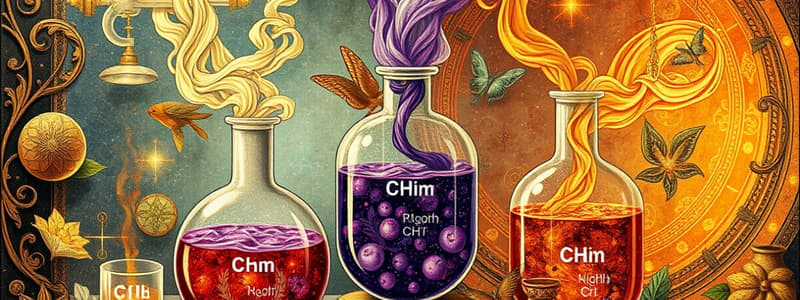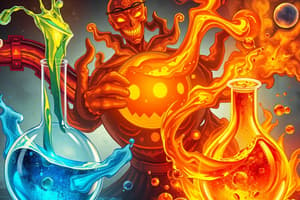Podcast
Questions and Answers
What is a decomposition reaction?
What is a decomposition reaction?
When something is broken down into smaller molecules (AB→A+B)
What is a single replacement reaction?
What is a single replacement reaction?
A reaction in which one element takes the place of another element in a compound.
What is a double replacement reaction?
What is a double replacement reaction?
A chemical change involving an exchange of positive ions between two compounds.
What is a combustion reaction?
What is a combustion reaction?
What is a combination reaction?
What is a combination reaction?
What is a chemical reaction?
What is a chemical reaction?
Does the mass of reactants equal the mass of products?
Does the mass of reactants equal the mass of products?
What is involved in decomposition reactions?
What is involved in decomposition reactions?
What is the activity series of metals?
What is the activity series of metals?
Where do double-replacement reactions usually take place?
Where do double-replacement reactions usually take place?
What do double-replacement reactions usually produce?
What do double-replacement reactions usually produce?
Combustion reactions never involve oxygen as a reactant.
Combustion reactions never involve oxygen as a reactant.
What is a frequent reactant in combustion reactions besides oxygen?
What is a frequent reactant in combustion reactions besides oxygen?
If the supply of oxygen is limited during a reaction, the combustion will not be complete.
If the supply of oxygen is limited during a reaction, the combustion will not be complete.
What are some indications that a chemical reaction occurred?
What are some indications that a chemical reaction occurred?
What are the five general types of reactions?
What are the five general types of reactions?
All chemical reactions fit uniquely into one category.
All chemical reactions fit uniquely into one category.
What else can a combination reaction be called?
What else can a combination reaction be called?
How many reactants are in a combination reaction?
How many reactants are in a combination reaction?
What do most decomposition reactions require?
What do most decomposition reactions require?
The products can be any combination of elements and compounds.
The products can be any combination of elements and compounds.
How can you identify a single-replacement reaction?
How can you identify a single-replacement reaction?
How many diatomic elements are there?
How many diatomic elements are there?
How is it determined which metal is displaced by another metal?
How is it determined which metal is displaced by another metal?
What can double-replacement reactions also be referred to as?
What can double-replacement reactions also be referred to as?
What are the diatomic elements?
What are the diatomic elements?
Flashcards are hidden until you start studying
Study Notes
Types of Chemical Reactions
- Decomposition Reaction: Breaks down a compound into smaller molecules (AB → A + B).
- Single Replacement Reaction: One element replaces another element in a compound.
- Double Replacement Reaction: Involves the exchange of positive ions between two compounds, often occurring in aqueous solutions.
- Combustion Reaction: Involves a substance reacting with oxygen, producing energy in heat and light.
- Combination Reaction: Two or more substances combine to form a single new substance; also known as synthesis reaction.
Characteristics of Chemical Reactions
- Chemical Reaction Definition: Transformation of one or more substances into different substances.
- Mass Conservation: The mass of reactants equals the mass of products.
- Reaction Evidence: Indicators include energy release (heat/light), gas production (bubbles), precipitate formation, and color change.
Specific Reaction Insights
- Decomposition Reactions: Typically involve one reactant that breaks down into two or more products, often requiring energy input (heat, light, or electricity).
- Combustion Reactions: Commonly involve hydrocarbons and always include oxygen; incomplete combustion occurs when oxygen supply is limited.
- Double-Replacement Reactions: Products may include a precipitate, gas, or molecular compound; also referred to as double-displacement reactions.
Reactant and Product Characteristics
- Single-Replacement Reaction Identification: Consists of an element and a compound on both reactant and product sides.
- Reactivity of Metals: Determined by the activity series, which ranks metals from most to least reactive.
- Diatomic Elements: There are 7 diatomic elements: H2, N2, O2, F2, Cl2, Br2, I2.
Reactants in Combination Reactions
- Combination Reaction Requirements: Typically requires two reactants, which may be either elements or compounds.
- Final Products: The products of chemical reactions can vary widely in elemental and compound composition.
Studying That Suits You
Use AI to generate personalized quizzes and flashcards to suit your learning preferences.




